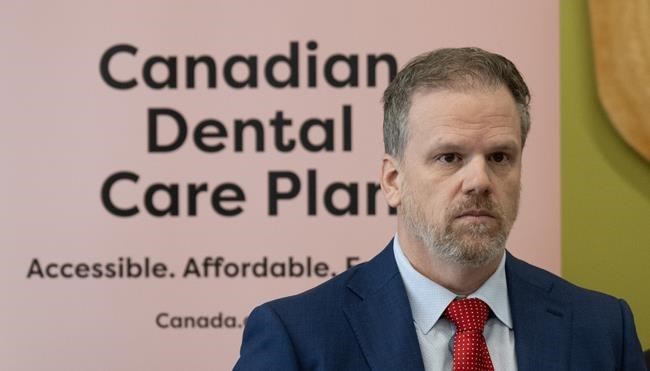OTTAWA — The federal government's newly unveiled vision of what it bills as a comprehensive suite of dental benefits looks a lot like typical insurance coverage, right down to the ID card patients would hand over at the dentist's office.
But industry advocates say the new program isn't the same as the insurance coverage Canadians typically get from their employers — and patients need to be crystal clear about some important differences.
"I just don't want people thinking it's a free program," said Dr. Brock Nicolucci, president of the Ontario Dental Association.
"We don't have any of the details yet, and if people start giving up their dental insurance that they worked hard for … I would be very upset for people."
The federal program is set to start accepting enrolment applications this month from qualifying seniors over the age of 87. Enrolment eligibility will slowly expand over the course of the next year to include all seniors, children under the age of 18 and people with disabilities.
The program was developed at the behest of the NDP as part of a political agreement to secure the opposition party's support for the government on key votes.
The plan is intended for low- and middle-income people who don't already have access to insurance.
"This isn't an insurance plan," Nicolucci said. "This is a benefit that the government is providing to the Canadians that unfortunately don't have access to care."
There's a chance seniors could opt to stop paying for private insurance in favour of the government program instead, said Dr. Carlos Quiñonez, vice-dean and director of the school of dentistry at Western University in London, Ont.
"I wouldn't call it a concern, but there is a real issue," Quiñonez said in an interview.
A 2022 Statistics Canada survey found 32.5 per cent of seniors had private dental insurance, which they either pay for themselves or get through an employer. Quiñonez said that represents a fairly small portion of the third-party insurance market, and often the private coverage isn't as robust as employer programs.
Nicolucci said he hopes people don't abandon their personal coverage in search of government-funded care, at least until the parameters of the new program become more clear.
The plan will allow patients with an annual household income less than $70,000 to avoid paying for dental services, while those making between $70,000 and $90,000 would shoulder between 40 and 60 per cent of the costs.
The cost to patients isn't yet clear, as dentists haven't yet seen the complete list of benefits that will be covered or how much the government plans to pay for each service.
The basket of services will closely reflect the federal health benefits program for registered First Nations and Inuit people, Health Canada officials said in a briefing provided Monday on the condition they not be named.
That program, called the Non-Insured Health Benefits program, has some distinct differences from an employer insurance program in terms of the eligibility criteria and administrative burden for oral health-care providers and patients.
With a plan provided by an employer, the benefits patients qualify for are usually fairly clearly defined, said Dr. Aaron Burry, CEO of the Canadian Dental Association.
That may not be the case with the new government program.
"There is often a lot more administrative work and there can be more delays in terms of getting the approvals to actually say, 'Yes, this is worth it, we are going to be willing to pay for it,'" Burry said, adding that the need for pre-approvals is common in government plans.
Some dentists have avoided patients who are part of the existing program for fear of the avalanche of paperwork it requires, said British Columbia Dental Association president Dr. Robert Wolanski.
That can create "dental deserts" for enrolled patients who can't find a care provider.
Health Canada officials say they've learned from that experience, and Health Minister Mark Holland said Monday that getting oral-health care providers on board is key.
"I think we've been having very productive conversations on that basis and so I'm extraordinarily optimistic that there is going to be very strong uptake," Holland said.
Dentists don't yet know how patients' experiences will differ when they arrive for their appointment because those details haven't yet been released by the federal government.
But Wolanski said it's important for people to remember that unlike a private insurance program, people will have to requalify for the coverage every year.
"In order to qualify, you have to meet certain criteria in terms of your income, right? That doesn't exist in private insurance," said Wolanski, a dentist from Nanaimo, B.C.
Under the new government program, patients' eligibility and costs can shift year to year depending on their income.
Burry urged seniors and others who already have dental coverage to hold onto it until they have more information about the potential trade-offs.
The details of the program are expected to be fleshed out before May 2024, when the first cohort of plan members are expected to start being able to claim dental services through the government plan.
This report by The Canadian Press was first published Dec. 12, 2023.
Laura Osman, The Canadian Press



